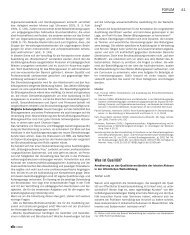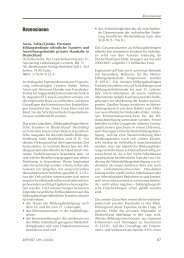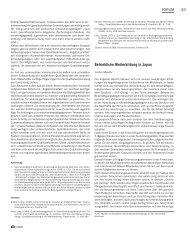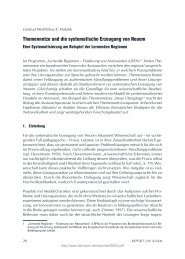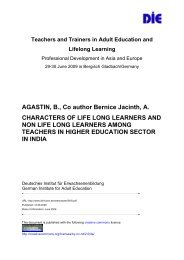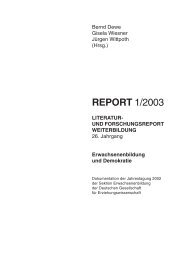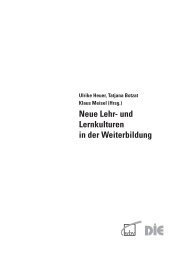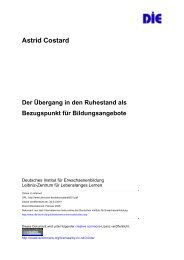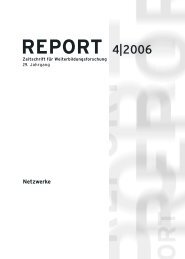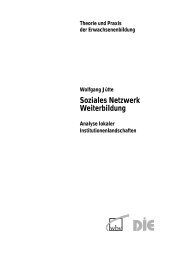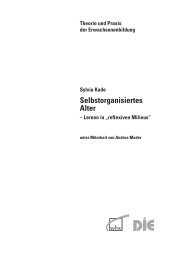Accreditation of Prior Experiential Learning (APEL)
Accreditation of Prior Experiential Learning (APEL)
Accreditation of Prior Experiential Learning (APEL)
You also want an ePaper? Increase the reach of your titles
YUMPU automatically turns print PDFs into web optimized ePapers that Google loves.
spective stresses the importance <strong>of</strong> interaction between the prior experience <strong>of</strong> the<br />
learner and the context in which learning takes place. Central to <strong>APEL</strong> is the notion that<br />
“learning is rooted in the individual’s general experience“ (Lueddeke 1997, p 221)<br />
entailing “a dynamic, ongoing interactive process between knowing and doing” (Hutchings/Wutzdorff<br />
1988, p 7). For Bailey and O’Hagan: “When the developmental <strong>APEL</strong><br />
systems are put in place the process that follows the ‘reflective learning cycle’ will<br />
empower learners by enabling them to value the learning they already have prior to<br />
any matching exercise (accreditation)” (1999, S. 57).<br />
Adults have built up a biography <strong>of</strong> such learning experiences through their daily lives<br />
in the family, community and workplace. Higher education institutions <strong>of</strong>fering <strong>APEL</strong><br />
need to recognise the value <strong>of</strong> such learning and integrate the approach into teaching<br />
and learning across the disciplines. Drawing on the constructivist approach this would<br />
“allow learners to examine the wider circumstances, issues and problems that have<br />
influenced their lives and situate their own experience within the social organisation“<br />
(Mandall/Michelson 1990, S. 5) – not only for adults but younger students as well.<br />
<strong>APEL</strong> is an important tool for promoting lifelong learning and social inclusion: “The<br />
question for all <strong>of</strong> us, therefore, is can <strong>APEL</strong> be regarded as one <strong>of</strong> the liberating mechanisms<br />
we as educators can employ to enable individuals to lift barriers to learning and<br />
policy makers to reach targets for lifelong learning?” (Georgious 1999, p 31)<br />
4. The <strong>APEL</strong> Process in Europe<br />
The practice <strong>of</strong> <strong>APEL</strong> varies across Europe. It has developed in different ways and at<br />
different rates. <strong>APEL</strong> is largely culturally determined, being shaped by national education<br />
systems. Research undertaken in two Socrates Adult Education projects indicate<br />
that while some countries are at a starting point, such as Spain and Portugal, others are<br />
well advanced, for example, France, the UK and Germany. In both Spain and Portugal<br />
there is a current policy push to develop <strong>APEL</strong> systems. <strong>APEL</strong> is largely confined to<br />
vocational learning in France, Germany and Finland. It is also generally within the<br />
university sector. <strong>APEL</strong> in Finland, for example, is linked to work-based learning in<br />
higher education. In Sweden while the life experiences <strong>of</strong> adults are assessed the term<br />
<strong>APEL</strong> is not used. <strong>APEL</strong> is now being developed in Eastern Europe.<br />
In France the <strong>APEL</strong> system is highly centralised through national legislation which<br />
gives it a high pr<strong>of</strong>ile and status within higher education. The 1985 decree in France<br />
allows a higher education institution to award exemption from qualifications normally<br />
required for entry to a course. A learner can also be exempted from some <strong>of</strong> the assessment<br />
requirements <strong>of</strong> the chosen course. Top-up studies may have to be undertaken. A<br />
1993 decree allows higher education institutions to award units, modules or part <strong>of</strong><br />
modules <strong>of</strong> a diploma course through the process <strong>of</strong> accreditation. Up to all but one<br />
unit can be achieved in this way. Legislation enables a potential learner to make a<br />
60


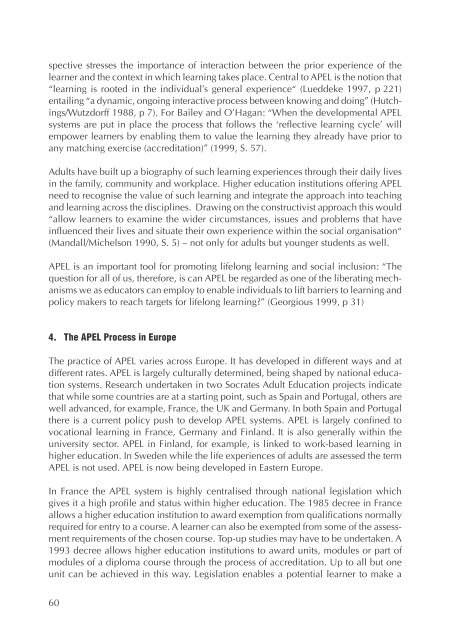
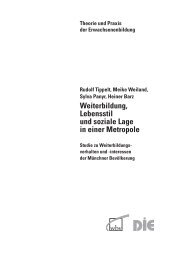
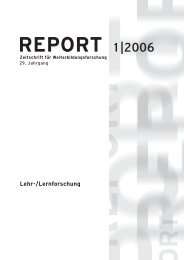
![PDF [KB 892] - Deutsches Institut für Erwachsenenbildung](https://img.yumpu.com/7495168/1/144x260/pdf-kb-892-deutsches-institut-fur-erwachsenenbildung.jpg?quality=85)
